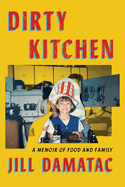
In the Philippines, the outdoor "dirty kitchen" is where the heavy-duty cooking takes place, as opposed to the indoor show kitchen where the privileged keep Western-style appliances meant to impress guests. Dirty Kitchen is a perfect title for Jill Damatac's debut memoir, given the themes of deception and inequality that followed her traumatic path from the Philippines to 22 undocumented years in the U.S.
In 1992, Damatac, then nine, flew from Manila to Newark, N.J., with her mother and sister to join her father. Whereas in the Philippines they'd lived in a "big marble house" he designed, in the U.S. they shared one cramped room in a relative's home. A crooked lawyer took thousands of dollars from them but never produced the promised visas. That lack of paperwork limited the family's opportunities and access. Damatac became a scapegoat for her father's anger over his frustrated ambitions. He beat her daily and demanded her earnings from part-time work.
Damatac is understandably angry about the lie of the American Dream, and she decries American imperialism in the Philippines, deftly incorporating the history of this multiply colonized country. Food becomes her primary way of reconnecting with her Indigenous culture. Filipino legends and recipes arise throughout the memoir, with each chapter named after a different dish she cooks. Pinikpikan (chicken stew) was traditionally made to appease the gods; Spamsilog (fried rice with canned pork) reflects American GIs' influence.
Though harrowing at times, this memoir is recommended to readers of Elaine Castillo, Stephanie Foo, Qian Julie Wang, and Tara Westover. It showcases the survival of the spirit and the sustaining power of heritage. --Rebecca Foster, freelance reviewer, proofreader and blogger at Bookish Beck

